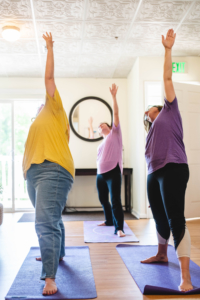Outpatient Group Examples
Our groups are supervised by a licensed team member and will meet all the same standards of the IOP of our signature continuum.
CBT/DBT (Therapeutic Group)

Hiking Group
This Hiking group explores the great outdoors of Boulder and takes advantage of the many surrounding scenic trails twice a week. We design each hike to address the specific needs of clients, build community, and deepen the connection to nature.
Movement Group (Therapeutic Group)
The Movement group aims to help clients increase their relationships with their bodies. By using movement to describe an experience, people can express feelings that would otherwise go unsaid. Here we take an introductory look into the connection of movement and the mind while building a sense of community and connection through games and other structured movement activities.
Treehouse Groups/Activities and Planning Session (Psychosocial Group-Membership is Free)
The goal of the Clubhouse/Treehouse groups and activities is to improve health, increase opportunity, and end social and economic isolation for people living with mental illness. At the Treehouse, community is therapy. We work in partnership with our members – people living with serious mental illness- to ensure that they are at the center of their own recovery. We utilize “Social Practice” which is a specialized form of therapy that uses the setting of an intentional community to assist people in their mental health recovery. It focuses on a community-based approach of helping individuals learn new skills, hone their talents, build dignity, develop a sense of belonging, and make progress towards their goals. Elements of Social practice: Social design, Engagement, Relationship development, Natural feedback and intervention and Transitional Environments.

Transitional Living Community Meeting
Meeting in person in our beautiful backyard or in the park across the street, we connect as a community by sharing each client’s accomplishments with their mental health recovery and moving through the stages of independence. Fun community building activities including cooking meals together, yard games, yoga, gardening, and practice of social skills.
Yoga Group (Psychoeducational Group)
Yoga helps establish the mind-body connection. Clients work on postures that promote health and relaxation, while increasing flexibility and strength of the mind and body. With breath control, simple meditation, and gentle exercise, clients practice a 5,000-year-old discipline. The goal is to discover personal patterns on the mat, which can be applied to life off the mat. These patterns can include intention, positivity, coping mechanisms, and general wellbeing.
Revitalizing your Recovery Group (Therapeutic Group)
Group therapy that focuses on addictive or maladaptive behaviors while encouraging healthier coping mechanisms. Various recovery options are discussed such as AA, SMART Recovery, Refuge Recovery, and Celebrate Recovery. Revitalizing Recovery also emphasizes substance use with co-occurring mental health disorders.
Anxiety Support Group (Therapeutic Group)
Anxiety Support Group will help you understand the underlying causes of your worries and fears, use mindfulness techniques for a quieter mind, introduce and/or enhance already used stress management techniques, increase a sense of relaxation instead of constant tension throughout your body and explore healthy problem-solving techniques so you are focusing on your own self-care and needs.
Exploring Emotions Through Storytelling (Psychoeducational Group)
Participants will listen to stories from different points of view and different cultures. Everyone will be encouraged to share their own stories. Every group member is expected to respect the other members of the group, as each person explores their own reactions and thoughts. The process of listening and storytelling is ancient wisdom from all cultures and is healing.
Art History and Mental Health Group
This group will examine different types of art as they relate to the human experience. The intent is to bring calm attentive awareness into singular focus by exploring mindful-centered art making practices. Inspiration for these practices/exercises will be drawn from art historical sources which will provide a framework for the recreation or reinterpretation of specific works of art.
Horticulture Therapy Group (Psychoeducational Group)
The basic premise behind horticultural therapy is that working with and around plants brings about positive psychological and physical changes that improve general wellness. Direct contact with plants helps guide a person’s focus away from stress, creates a sense of community and connection that focuses on growth, and teaches self-reliance all while providing a support system.
Equine-assisted Therapy (Therapeutic Group)
Equine-assisted therapy incorporates horses into the therapeutic process. People engage in activities such as riding, grooming, feeding, and leading a horse while being supervised by a mental health professional.
Drumming Group (Psychoeducational Group)
Drumming group encourages group cohesion by inviting clients to choose a percussive instrument and contribute to the energy of the group as a whole. We welcome each client by drumming their name, drum to positive affirmations, discuss how drumming can relieve stress, and increase our connection to community.
Referring to our Outpatient Programming
To make a referral, clinicians or clients may call our Admissions team at 720-218-4068.
Therapists
If you have a client whose needs exceed standard outpatient care of one session per week, this is an effective addition to these sessions. Clients are seen 3 days a week (9 hours of contact). A member of our clinical team will be in regular communication with you to ensure a solid partnership and collaboration on the client’s treatment plan.
Medication Providers & PCPs
Our program is here to support client’s in need of stabilization who are experiencing mental health symptoms – impacting their ability to be a positive contributing member of the community.
Fees
Our outpatient programming is currently a private pay service. Please call for more information.



